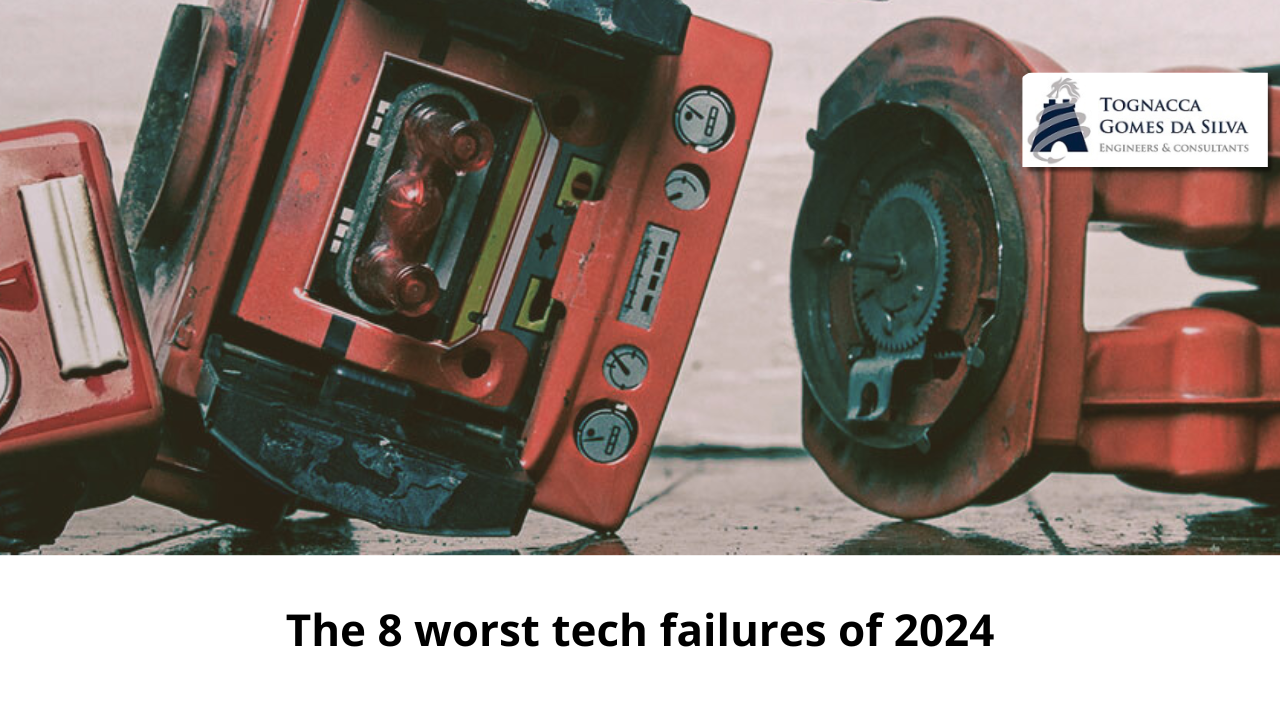They say you learn more from failure than from success. If that’s true, this is the article for you: MIT Technology Review’s annual list of the worst failures, scams, and fiascos in the world of technology.
Some mistakes were comical, like the “woke” AI that got Google into trouble by spawning black Nazis. Others have resulted in lawsuits, such as a CrowdStrike software error that left thousands of Delta Airlines passengers stranded. We also saw startups fail after growing between 2020 and 2022. After a period of very low interest rates. But then the economic winds changed. Money wasn’t cheaper and the result? Bankruptcy and dissolution for companies with ambitious projects, from vertical farms to carbon credits, that failed to become profitable.
Read more:
AI “woke” error
Many worry about bias in AI. But what if you add bias on purpose? Thanks to Google, we know where this leads: black Vikings and female popes.
Gemini AI’s imaging functionality, launched in February, was tweaked to highlight diversity, even if it went against the history books. Request an image of German soldiers from World War II, and the software created a sort of Benetton ad with Wehrmacht uniforms.
Critics seized the opportunity, and Google made an embarrassing withdrawal. The company paused Gemini’s ability to generate images of people and admitted that its well-intentioned attempt to be inclusive had gone “overboard.”
The free version of Gemini does not yet create images of people. However, paid versions allow it. When we requested an image of 12 CEOs of biotechnology companies, the software generated a realistic image of middle-aged white men. It’s not ideal. But closer to reality.
Boeing Starliner
Houston, we have a problem. And it’s the Starliner, Boeing’s reusable spacecraft, that left NASA astronauts Sunita “Suni” Williams and Barry “Butch” Wilmore stranded on the International Space Station.
The June mission was supposed to be a quick eight-day trip to test the Starliner before longer missions. However, problems with helium leaks and thrusters forced the spacecraft to return empty.
Now, Butch and Suni will not return to Earth until 2025, when a spacecraft from SpaceX, a Boeing competitor, is scheduled to pick them up. Boeing and NASA have prioritized safety, but that wasn’t Boeing’s only incident in 2024. The year began with a door coming loose from a plane mid-flight, a worker strike, fines for misleading the government about safety of the 737 Max (which made our 2019 list) and the CEO’s resignation in March.
After the Starliner fiasco, Boeing fired the head of its space and defense unit.
CrowdStrike crash
Cybersecurity company CrowdStrike’s motto is “We stop hacks.” And it’s true: no one can hack your computer if you can’t turn it on.
That’s exactly what happened on July 19, when thousands of Windows computers at airlines, TV stations and hospitals displayed the famous “blue screen of death”.
The problem was not caused by hackers or ransomware, but by a faulty update distributed by CrowdStrike itself. CEO George Kurtz went to X to say the problem was caused by a “defect” in a single file.
But who is to blame? CrowdStrike customer Delta Airlines canceled 7,000 flights and sued the company for $500 million, claiming the failure caused a “global catastrophe.” CrowdStrike fired back, holding Delta management accountable and saying the airline deserves nothing more than a refund.
Vertical Farms
Growing lettuce in buildings using robots, hydroponics and LED lights seemed like the future. Startup Bowery, a leader in “vertical farms,” has raised more than $700 million to do so. However, in November, Bowery went bankrupt, being considered the biggest startup bankruptcy of 2024, according to CB Insights.
Bowery promised that its farms were “100 times more productive” per square meter than traditional farms, stacking rows of plants up to 12 meters high. In practice, however, the company’s lettuce was more expensive, and a persistent plant infection problem at its East Coast facilities made it difficult to deliver the product, regardless of price.
Explosive pagers
They would beep, and then explode. In Lebanon, fingers and faces were mutilated in an attack described as Israel’s “surprise opening blow in an all-out war to weaken Hezbollah.”
The attack was terribly ingenious. Israel created shell companies that sold thousands of pagers with hidden explosives to the Islamic faction, which already suspected that their phones were being spied on.
It was a triumph for Israeli spies. But would it have been a war crime? A 1996 treaty prohibits the intentional manufacture of “apparently harmless objects” designed to explode. According to the New York Times, 9-year-old Fatima Abdullah died when her father’s pager rang and she ran to give it to him.
23andMe
The company that pioneered direct-to-consumer genetic testing is sinking fast. Its share price is close to zero, and the plan to develop valuable medicines was abandoned after the team responsible was fired in November.
23andMe has always had an air of celebrity, boosted by good media coverage. Now, however, the press only brings bad news. The company, under the control of its founder Anne Wojcicki, is in trouble following the mass resignation of independent directors in September. Customers are beginning to worry about what will happen to their DNA data if 23andMe goes out of business.
The company claims to have created “the world’s largest collaborative platform for genetic research.” That is true. But he could never figure out how to make a profit.
AI Slop
“Slop” is the term used for scraps and scraps that pigs eat. “AI slop” is what you and I are consuming more and more of on the internet now that people are flooding the web with AI-generated text and images.
The New York Times calls AI slop “iffy.” For Wired, it is “Dadaist”. It is often bizarre, like Shrimp Jesus (don’t ask), or misleading, like the image of a girl shivering in a rowboat supposedly depicting the U.S. government’s inadequate response to Hurricane Helene.
AI slop is often fun. But it is, most of the time, a waste of time: it is not checked. It exists mainly to gain clicks. It’s that account with the blue badge on the X that posts 10-part threads praising AI — threads written by AI itself. More importantly, AI slop is everywhere. This year, researchers claimed that about half of long-form posts on LinkedIn and Medium were partially generated by AI.
Voluntary carbon markets
Your company generates emissions that contribute to global warming. So why not pay to plant trees or finance more efficient stoves for families in Central America? So you could achieve net-zero emissions and help save the planet.
Great idea, but good intentions are not enough. This year, the Nori carbon market closed, as did Running Tide, a company that tried to sink carbon into the ocean. “The problem is that the voluntary carbon market is voluntary,” the Running Tide CEO wrote in a farewell post, citing a lack of demand.
While companies like to blame demand, that’s not the only problem. Flawed technologies, questionable credits and fictitious offsets have created a crisis of credibility in carbon markets. In October, US prosecutors charged two men in a $100 million scheme involving the sale of fake emissions credits.
( fonte: MIT Technology Review)



